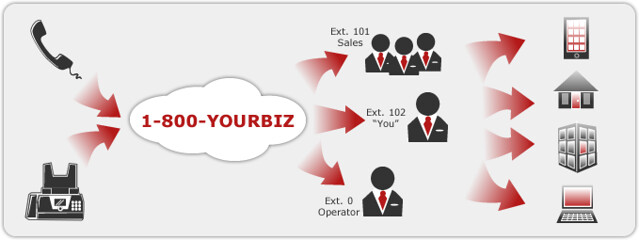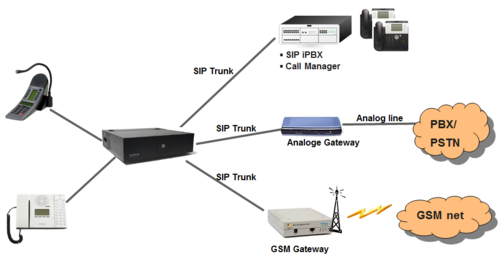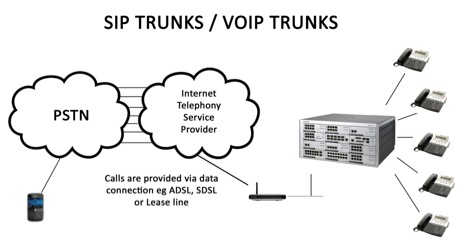The world of telecommunication can be a tricky one sometimes, especially to those who are new in this kind of technology. However, with the emergence of innovative technology, it is imperative for those who run a business to know the different technical terms as well as the different features involved particularly when it comes to the PBX phone system.

What Does PBX Mean? PBX Abbreviation
You might have asked, “What does PBX stand for phone?” To start, PBX acronym stands for Private Branch Exchange. It was developed to provide cost-savings and ease of communication access to the small, medium, and large scale businesses. The users of the PBX phone system have the freedom to communicate within their company and with the outside world by utilizing various communication channels such as VoIP over IP and the like.
How Does a PBX Phone System Work?
For you to understand how a PBX phone system works, you should first be aware of how a traditional switchboard functions. Traditional telephone lines are linked via trunk lines to the service provider’s Local Central Office (LCO). From there, all incoming and outgoing calls are then routed by a human operator that is physically stationed on that location.
In addition to this, there are other features that service providers can offer to you such as caller ID, voice mail In addition to this, there are other features that service providers can offer to you such as caller ID, voice mail recording, and call forwarding capabilities, to which additional charges are incurred in your monthly bills.
This is the main reason why Private Branch Exchange is more preferred by companies and business owners regardless of the size of their organizations.

Types of PBX Phone Systems
PBX phone system is a broad term to use for a specific business. It might be confusing to understand the different PBX systems, so to address your concern about what does PBX stand for in telecom, we compiled below the various types and their respective definition.
- Traditional PBX – we are aware that the traditional PBX system gets its name its usage of the traditional landlines. This phone system is based on hardwired connectivity throughout the office and to landlines outside.
Of all the available types of PBX systems, traditional PBX seems to be reliable in terms of voice quality.
- Hosted PBX – whenever you hear the phrases “IP PBX phone system”, “cloud PBX phone system”, and “virtual PBX phone system”, don’t be confused. Together with hosted PBX, they serve the same purpose.
Hosted PBX is provided by an off-site VoIP service provider. This means that an outside provider “hosts” your PBX system and takes care of the physical servers and services to make your communication system running smoothly.
- IP PBX – Internet Protocol Private Branch Exchange allows calls to function using VoIP. All the information that went through phone communication linked up with your data and transferred using Internet Protocol (IP).
The conversion of data means less cost for each call you make than a routed call through a traditional PBX. And since it is a virtual phone system, its underlying technology delivers your phone calls using the Internet Protocol
What is the difference Between PBX and PABX?
In traditional Private Branch Exchange (PBX) systems, some human operators managed the switchboards that are being used in telephone exchanges. And since this is a manual type of managing switchboards, operators use their hands to plug the wires.
On the other hand, Private Automatic Branch Exchange (PABX) systems utilize computers to switch automatically. That is the main difference between the two.

PBX Comparison: On-Prem vs. Hosted PBX
Even though a hosted PBX has the same features and service being provided by an on-premise PBX, the process of installation points out the significant difference.
A typical PBX is known as on-premise PBX. Although it allows you to communicate with individuals inside and outside your business organizations through various communication channels, installation and set-up are done inside the company premises and require you to hire an IT expert that has the necessary skills required.
Meanwhile, a hosted PBX phone system shifts your phone and communication hardware or equipment to a trusted VoIP service such as Telnum. By saying this, a hosted PBX resides in the cloud, meaning you don’t need any special piece of hardware or equipment to install inside your organization, thus minimizing the installation and expenses at the same time. Your PBX provider or “host” is the one who takes the full responsibility of maintaining the technology for your business completely.
What is the difference between PBX and IP PBX?
Considered as a classic multi-line phone system, a traditional PBX gives you limitation to a certain maximum number of external telephone lines, and again, to a certain maximum number telephone or extensions inside the organizations. Aside from that, you are responsible for the operation of your PBX phone system since you are running your own hardware.
However, as time passes by and the emergence of new and innovative technology, the capability of upgrading the consumers’ telephone system is now possible such as the IP PBX.
We have to clarify what does IP stands for in marketing. This is vital so you can get the most out of its benefits. Internet Protocol Private Branch Exchange (IP PBX) phone system allows you to manage calls, route calls, and handle messaging by using Internet Protocol data. It also has the same functions of a traditional PBX, but due to the advancement of telephony technology, it cannot handle calls only, but also data. Most of the functionalities of an IP PBX are made with software, unlike the “old school” PBX where it usually takes place on hardware.
Is PBX a VoIP?
Although both these two phone systems have the same end goal which is to make and receive calls, certain differences are worth noting. Remember that the traditional PBX systems have already existed and been used for years by those organizations that want a dedicated phone system. While VoIP uses Internet data to make your calls. Knowing the advantages and disadvantages of the two will greatly help you decide which phone system is the best fit for your business.
The PBX system is a traditional way of communicating and has been used for so many years. If you pick up a phone to call a customer, both of you are physically connected through the exchange network.
VoIP system utilizes the Internet to convert voice signals into data packets that are conveyed over the Internet. If you pick up a phone to call a customer, voice signals are carried through your network then over the Internet.
Why Do Companies Use PBX?
Companies are using PBX because this type of phone system allows them to provide a better caller experience as well as improving their internal communications. PBX’s benefits are also much easier to appreciate in terms of how well customers’ calls are processed. As an example of this, businesses are now capable of customizing their phone service to better meet the needs of their callers and provide them with a better way of business communication.
Which PBX Phone System is Best for Small Business?
There was a time where the only choice for your communication needs was limited to the traditional PBX phone system only. But as our communication technology continues to evolve, there are now more options to choose from. One of them is the IP PBX that comes with helpful and more efficient features than the traditional PBX.
However, you still have to consider certain things and assess your business needs and capabilities in choosing the right one for your business.
Choose PBX if:
- Your Internet connection is not stable.
Assess your Internet connection reliability. If it proves to be unstable, then choose the traditional one to meet your communication needs. An IP PBX needs a very stable Internet connection. Choosing an IP PBX phone system under an unstable Internet connection is a very bad decision.
- You want to trace calls for emergency services.
Unlike the IP PBX, your traditional PBX could still be able to call emergency service providers in case of power outages and emergencies.
Choose IP PBX if:
- You would like to cut the cost of your phone service
This might come as the main reason why many businesses are now switching to an IP PBX phone system. While a traditional PBX might cost as much as $1,000 per employee, using the IP PBX would have an average monthly cost for each user from $25 to $30! And if you choose Telnum’s phone system, you could certainly save more than what you expect. It comes along with lots of amazing features dedicated to the communication needs that you would surely love.
- You want to avoid on-site hardwiring
If you want a hassle-free communication system for your organization, IP PBX is the best choice. This cloud-based phone system takes care of all the maintenance that is needed to run your business. No fuzz, no hassle. And if you want to know more about how your business can achieve this kind of service, you can always get in touch with us here in Telnum. We will be glad to help you in choosing the right phone system that would perfectly work for you.
- You want your business to be flexible and scalable
Your business is required to be flexible at all times. This means that you should be able to adapt easily if there are changes that need to be addressed quickly, such as adding new employees or hiring remote workers.
What Features of a PBX Phone System Do Modern Businesses Need?
Speaking of features, IP PBX has a variety of helpful value-added features that a traditional PBX can’t provide for modern businesses. However, regardless of what type of phone service you want to consider, you still have to check for these following features to maximize your business communication process.
- Call Recording
Call recording should not be taken for granted. This feature is very helpful since time would come that you need to backtrack incoming and outgoing calls for future reference. This also improves in scaling up your communication engagement with your clients or prospects.
- Least Cost Routing
Least Cost Routing (LCR) simply means minimizing the call expenses by dividing or breaking call traffic between different carriers. Utilizing this feature enables you to automatically route your calls on the lowest available cost.
- VoIP (Voice over IP) Technology
As mentioned above, VoIP uses broadband Internet, unlike the traditional copper lines. There are different advanced features that VoIP can provide to your business such as HD audio calls and the like, which is impossible for traditional phone systems to offer for your business.
- Unified Communication
With Unified Communication, you can integrate enterprise communication services like audio, web, video conferencing, instant messaging or chat, and other efficient voice features. This essential feature allows you to manage and track your clients as well as conversations within your organization.
Conclusion
If you are still using the traditional phone system mentioned above, it is NOW the right time to upgrade your business phone system. With Telnum, we help you build and establish a permanent local presence nationally or internationally. Our global VoIP phone services are exclusively designed and focused on your office, home, and business needs.
If you need further assistance in considering the right phone system for your business, just send us an email or give us a call. Our phone experts will be more than happy to assist you.

